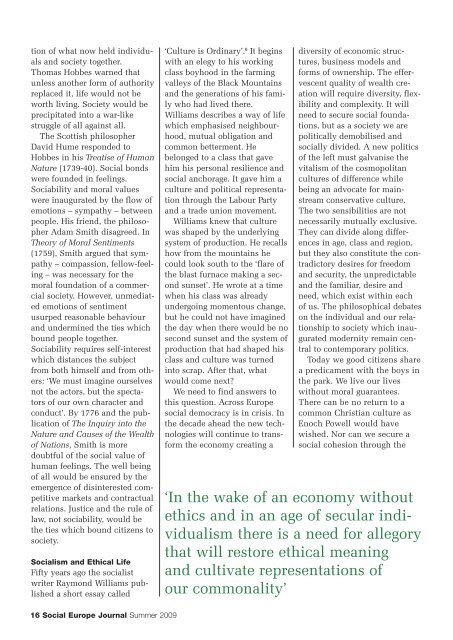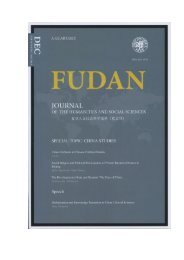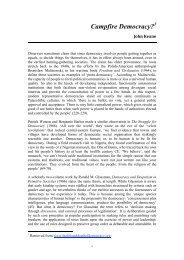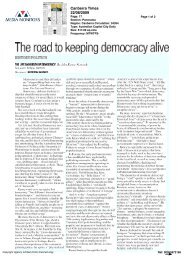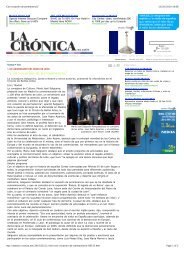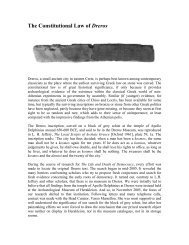The Ethics of Capitalism - Social Europe Journal
The Ethics of Capitalism - Social Europe Journal
The Ethics of Capitalism - Social Europe Journal
Create successful ePaper yourself
Turn your PDF publications into a flip-book with our unique Google optimized e-Paper software.
tion <strong>of</strong> what now held individuals<br />
and society together.<br />
Thomas Hobbes warned that<br />
unless another form <strong>of</strong> authority<br />
replaced it, life would not be<br />
worth living. Society would be<br />
precipitated into a war-like<br />
struggle <strong>of</strong> all against all.<br />
<strong>The</strong> Scottish philosopher<br />
David Hume responded to<br />
Hobbes in his Treatise <strong>of</strong> Human<br />
Nature (1739-40). <strong>Social</strong> bonds<br />
were founded in feelings.<br />
Sociability and moral values<br />
were inaugurated by the flow <strong>of</strong><br />
emotions – sympathy – between<br />
people. His friend, the philosopher<br />
Adam Smith disagreed. In<br />
<strong>The</strong>ory <strong>of</strong> Moral Sentiments<br />
(1759), Smith argued that sympathy<br />
– compassion, fellow-feeling<br />
– was necessary for the<br />
moral foundation <strong>of</strong> a commercial<br />
society. However, unmediated<br />
emotions <strong>of</strong> sentiment<br />
usurped reasonable behaviour<br />
and undermined the ties which<br />
bound people together.<br />
Sociability requires self-interest<br />
which distances the subject<br />
from both himself and from others:<br />
‘We must imagine ourselves<br />
not the actors, but the spectators<br />
<strong>of</strong> our own character and<br />
conduct’. By 1776 and the publication<br />
<strong>of</strong> <strong>The</strong> Inquiry into the<br />
Nature and Causes <strong>of</strong> the Wealth<br />
<strong>of</strong> Nations, Smith is more<br />
doubtful <strong>of</strong> the social value <strong>of</strong><br />
human feelings. <strong>The</strong> well being<br />
<strong>of</strong> all would be ensured by the<br />
emergence <strong>of</strong> disinterested competitive<br />
markets and contractual<br />
relations. Justice and the rule <strong>of</strong><br />
law, not sociability, would be<br />
the ties which bound citizens to<br />
society.<br />
<strong>Social</strong>ism and Ethical Life<br />
Fifty years ago the socialist<br />
writer Raymond Williams published<br />
a short essay called<br />
‘Culture is Ordinary’. 6 It begins<br />
with an elegy to his working<br />
class boyhood in the farming<br />
valleys <strong>of</strong> the Black Mountains<br />
and the generations <strong>of</strong> his family<br />
who had lived there.<br />
Williams describes a way <strong>of</strong> life<br />
which emphasised neighbourhood,<br />
mutual obligation and<br />
common betterment. He<br />
belonged to a class that gave<br />
him his personal resilience and<br />
social anchorage. It gave him a<br />
culture and political representation<br />
through the Labour Party<br />
and a trade union movement.<br />
Williams knew that culture<br />
was shaped by the underlying<br />
system <strong>of</strong> production. He recalls<br />
how from the mountains he<br />
could look south to the ‘flare <strong>of</strong><br />
the blast furnace making a second<br />
sunset’. He wrote at a time<br />
when his class was already<br />
undergoing momentous change,<br />
but he could not have imagined<br />
the day when there would be no<br />
second sunset and the system <strong>of</strong><br />
production that had shaped his<br />
class and culture was turned<br />
into scrap. After that, what<br />
would come next<br />
We need to find answers to<br />
this question. Across <strong>Europe</strong><br />
social democracy is in crisis. In<br />
the decade ahead the new technologies<br />
will continue to transform<br />
the economy creating a<br />
diversity <strong>of</strong> economic structures,<br />
business models and<br />
forms <strong>of</strong> ownership. <strong>The</strong> effervescent<br />
quality <strong>of</strong> wealth creation<br />
will require diversity, flexibility<br />
and complexity. It will<br />
need to secure social foundations,<br />
but as a society we are<br />
politically demobilised and<br />
socially divided. A new politics<br />
<strong>of</strong> the left must galvanise the<br />
vitalism <strong>of</strong> the cosmopolitan<br />
cultures <strong>of</strong> difference while<br />
being an advocate for mainstream<br />
conservative culture.<br />
<strong>The</strong> two sensibilities are not<br />
necessarily mutually exclusive.<br />
<strong>The</strong>y can divide along differences<br />
in age, class and region,<br />
but they also constitute the contradictory<br />
desires for freedom<br />
and security, the unpredictable<br />
and the familiar, desire and<br />
need, which exist within each<br />
<strong>of</strong> us. <strong>The</strong> philosophical debates<br />
on the individual and our relationship<br />
to society which inaugurated<br />
modernity remain central<br />
to contemporary politics.<br />
Today we good citizens share<br />
a predicament with the boys in<br />
the park. We live our lives<br />
without moral guarantees.<br />
<strong>The</strong>re can be no return to a<br />
common Christian culture as<br />
Enoch Powell would have<br />
wished. Nor can we secure a<br />
social cohesion through the<br />
‘In the wake <strong>of</strong> an economy without<br />
ethics and in an age <strong>of</strong> secular individualism<br />
there is a need for allegory<br />
that will restore ethical meaning<br />
and cultivate representations <strong>of</strong><br />
our commonality’<br />
16 <strong>Social</strong> <strong>Europe</strong> <strong>Journal</strong> Summer 2009


